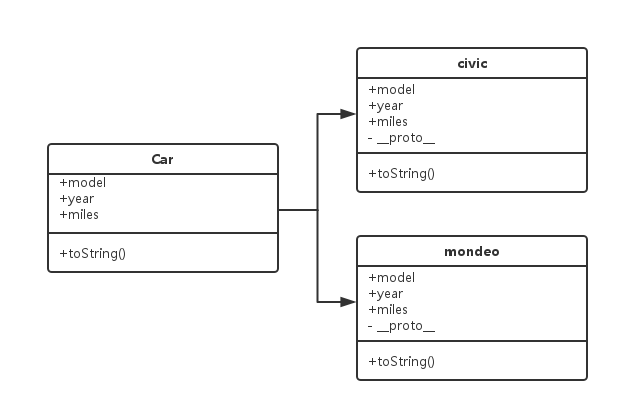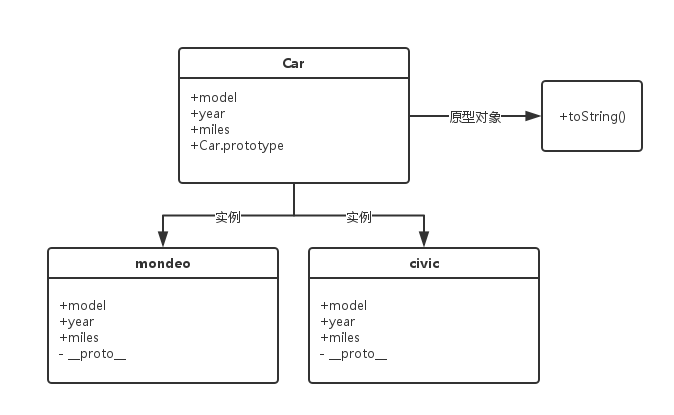设计模式(二):构造器模式与模块模式
这一篇主要讲述构造器(Constructor)模式和模块(Module)模式以及相关的变体模式,例子是JavaScript代码。
构造器(Constructor)模式
对象构造器用于创建特定类型的对象——准备好对象以备使用,同时接收构造器可以使用的参数,以在第一次创建对象时,设置成员属性和方法的值。概念并没什么好说的,这种模式最是简单,虽然名字是那么吊炸天,但内容没什么,看下面例子就可明白。
基本构造器
function Car( model, year, miles ) { this.model = model; this.year = year; this.miles = miles; this.toString = function () { return this.model + " has done " + this.miles + " miles"; }; } // Usage: // We can create new instances of the car var civic = new Car( "Honda Civic", 2009, 20000 ); var mondeo = new Car( "Ford Mondeo", 2010, 5000 ); // and then open our browser console to view the // output of the toString() method being called on // these objects console.log( civic.toString() ); console.log( mondeo.toString() );

PS:类与对象实例效果图。
带原型的构造器
function Car( model, year, miles ) { this.model = model; this.year = year; this.miles = miles; } // Note here that we are using Object.prototype.newMethod rather than // Object.prototype so as to avoid redefining the prototype object Car.prototype.toString = function () { return this.model + " has done " + this.miles + " miles"; }; // Usage: var civic = new Car( "Honda Civic", 2009, 20000 ); var mondeo = new Car( "Ford Mondeo", 2010, 5000 ); console.log( civic.toString() ); console.log( mondeo.toString() );

PS:类与对象实例效果图。
两者区别
这两个示例区别就在于toString方法的定义。前一个例子每一个实例都各自重新定义这种方法;后一个例子使用原型定义方式,使得这种方法在所有的Car实例之间共享,好处在于,共享函数能够减少内存消耗(我认为),优化代码。
这里需要注意几件事:
1. 函数才有prototype属性,指向的是一个实例对象(不是函数)。
2. 每个实例对象都有__proto__的属性,这个属性指向原函数所指的原型对象(原型继承的基础)。
模块(Module)模式
模块模式是为类提供私有变量和特权方法(有权访问私有变量和私有函数的公有方法)的方法。在JavaScript,就可通过闭包的方式,模拟实现模块模式。
对象字面量:
var myModule = { variableKey: variableValue, getKey: function () { // ... } };
严格上讲,对象字面量实现的只是不完整的模块模式,因为无法达到变量、方法私有效果。不过确实有分离和组织代码的能力,也就算一种简略的模块模式的实现方式。
简单例子:
var myModule = (function(){ var privateVar = 10; return { getPrivateVar : function(){ return privateVar; } } })();
引入全局变量例子:
// Global module var myModule = (function ( jQ, _ ) { function privateMethod1(){ jQ(".container").html("test"); } function privateMethod2(){ console.log( _.min([10, 5, 100, 2, 1000]) ); } return{ publicMethod: function(){ privateMethod1(); } }; // Pull in jQuery and Underscore })( jQuery, _ );
PS:书中还有相应结合Dojo、ExtJS、YUI、jQuery等框架的模块模式的实现方式,不过我觉得只要理解模块模式的就行了,也不一一列例子。
揭示(Revealling)模块模式
这种是模块模式的改进版本,它是在模块代码底部,定义所有对外公布的函数(仅是指针)和变量。
var myRevealingModule = (function () { var privateVar = "Ben Cherry", publicVar = "Hey there!"; function privateFunction() { console.log( "Name:" + privateVar ); } function publicSetName( strName ) { privateVar = strName; } function publicGetName() { privateFunction(); } // Reveal public pointers to // private functions and properties return { setName: publicSetName, greeting: publicVar, getName: publicGetName }; })();
这种模式我经常使用,它很容易指出哪些函数和变量可以被公开访问,增强了可读性。
总结
有时我们在不经意间就使用了某种模式(例如上面两种模式),但并不知道写的东西已经是前人总结很好的东西了。所以在细细阅读过程中,书中内容使得我自己对模式的认识更加系统全面,也能改正自己使用上的误区。
参考文献
1. 《Learning JavaScript Design Patterns》 by Addy Osmani
https://addyosmani.com/resources/essentialjsdesignpatterns/book/
2. 《JavaScript设计模式》by 徐涛【译】
本文为原创文章,转载请保留原出处,方便溯源,如有错误地方,谢谢指正。


